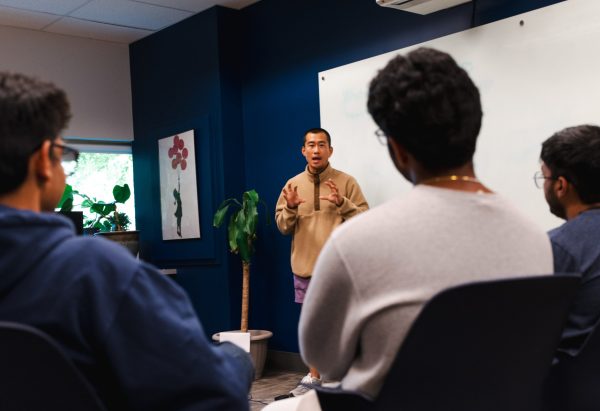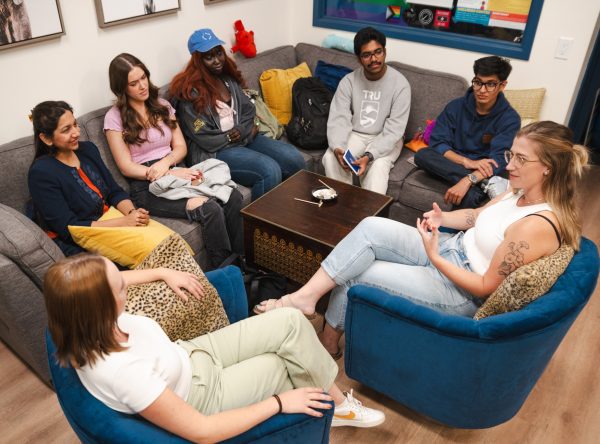Student Storyteller and visual arts major Reese Dolphy is a student with a vision. He can picture a final product so bright, shiny and perfect that it’s just about impossible to start a project or assignment, let alone finish it.
“If it were an important task, as all assignments are, I carried a heaviness around,” says Dolphy. “I would become paralyzed with guilt, shame and self-doubt, staring at the blank page in pain. This anxiety often manifested as stalled productivity and a lot of last-minute assignments. It’s a cruel irony.”

Reese Dolphy
Procrastination can become not only an academic or professional concern, but also a blight on your emotional and social well-being. As assignments pile up, so does the weight of that creative block. It also reduces flexibility in your schedule, making it challenging to spend time with friends or enjoy some relaxing, introspective time. With that in mind, Dolphy signed up for a workshop series co-facilitated by Thompson Rivers University (TRU) counsellors Kristin Robinson and Mark Zhang that tackles and dismantles the perfectionist state of mind.
“’Perfect’” is such a rigid label,” says Dolphy. “I realize now that this mindset doesn’t allow any room for mistake-making or for a process or product to evolve. The goal needs to focus on taking small steps — all you need to do is get started. Writing one sentence, brainstorming an outline, creating a mood board, booking a study room, or rallying the team for the dreaded group project. That way, you get to experience success and a sense of completion more often, which helps with confidence.”
In Overcoming Procrastination, Robinson and Zhang helped the group recognize how patterns appear in their everyday lives, introducing concepts such as “AM” (Against Me) thoughts and “FM” (For Me) messages, and differentiating between a “critical” lens and a “criticism” lens.

Counsellor Mark Zhang leads the Sense of Belonging socials and hosts “Leave Your Mark” on CFBX.
Through this four-part group counselling workshop, Dolphy enjoyed learning about others’ experiences and approaches to navigating perfectionist fatigue. Zhang shared what works for him, while Robinson explored how a sense of humour can lighten anxiety around performance and the creative process.
“Kristin and Mark taught us how to reframe situations and retrain our brains to transmute AM thoughts into FM thoughts. Now, when I have an AM thought, I refocus by taking action. Any negative or unhelpful thought is just another song playing on the radio. Not only do I not have to listen to it, I have the power to change the station to a different thought.”
More than ever, Dolphy recognizes the importance of mindfulness.

Counsellor Kristin Robinson (right) also co-facilitates Relationship 101, the SV Support Source and healthy body image workshops.
“Being tuned in to your thoughts and noticing how they impact your ability to act is the number one goal. Also, recognizing the difference between intuition and noise allows you to avoid internalizing every thought as an extension or reflection of yourself. You are not your thoughts. Your mind is an echo of all the words and experiences you’ve had throughout your life. Negative thoughts don’t have to define who you are.”
One-on-one counselling has numerous benefits, but Dolphy encourages others to seek out therapeutic, supportive group communities. “Sharing our fears and frustrations was so enlightening. I realized that I wasn’t alone. Like everyone else, I’m a person — a work in progress — reacting to a very common human experience in a complex world. The sense of commonality between us was such a comfort. I was able to extend the empathy I feel for others toward myself, allowing me to generate more self-compassion and inner grace.”
Since the workshop, Dolphy has felt the grip of perfectionism softening. “When those rigid and judgmental thoughts creep in, I gently remind myself that these thoughts are temporary and whatever the problem is, there will be a strategy or a solution.”
The key takeaway from the series was Dolphy’s changed perspective on this long-standing struggle.
“I am much better at receiving feedback because the criticism doesn’t bother or burden me the way it used to. In fact, I appreciate it more than ever because I know it’s not an attack on my character, it’s an invitation to improve processes.”
Nowadays, Dolphy is less worried about that messy first draft. “Sure, the project’s not perfect at first, but it’s not supposed to be. But I’ve gotten started and I’m moving forward, and that’s good enough.”
Learn more about support systems at TRU through tru.ca/current.

